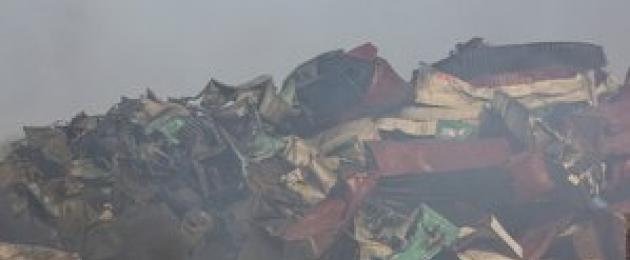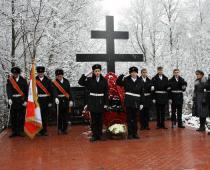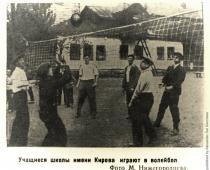Two huge explosions resulting in a large number of victims, hundreds of houses destroyed, thousands of destroyed cars are the results of a safety violation in the storage of explosives in a Chinese port.
Explosions in the port of Tianjin on August 12, 2015
An object: Ruihai Logistics warehouses, Tianjin seaport, China. The company was engaged in the transportation and storage of toxic and hazardous substances.
Victims: As a result of the disaster, 160 people died (including 96 firefighters and 11 policemen), 13 people a month later were still missing, over 400 people were hospitalized.
Causes: The causes of the crash are under investigation. The most likely cause of fire and explosions is a violation of safety regulations and rules for the storage of hazardous substances.
Chronicle of events
The first reports of a fire in the port came from 22:50 local time (15:50 Moscow time). Fire crews arrived at the scene of the fire, but the spread of fire could not be stopped.
IN 23:36 the first explosion thundered, and after 30 seconds - the second. The explosions caused serious damage and increased the area of fire. More and more crews of firefighters and rescuers arrived to fight the fire. In total, more than 1000 people participated in extinguishing the fire.
IN 14:30 August 13 firefighting was suspended (the main outbreaks were suppressed), as it was necessary to accurately determine the location and quantity of chemicals.
In the following days ( August 15, 16, 21) new explosions occurred in the warehouses and new fires appeared, but they were quickly eliminated. Burning cars and containers probably exploded.
Shortly after the disaster, rumors began to spread around the city of sodium cyanide contamination, 700 tons of which were stored in the ill-fated warehouses. These rumors were confirmed and August 14 the authorities announced the evacuation of residents from a three-kilometer zone around the epicenter, and the contaminated areas began to be treated with hydrogen peroxide. TO August 17 hazardous substance has been deactivated.
All these days and up to the present time, emergency recovery work is being carried out.
Consequences of the disaster
The explosions had a high power: the first one was equivalent to 3 tons of TNT, the second one - 21 tons. They caused seismic tremors of magnitude 2.3 and 2.9. Flashes from the explosions were visible from space. However, thanks to the work of rescuers, favorable meteorological conditions and just a happy coincidence, the disaster had by no means catastrophic consequences.
The buildings of the warehouse complex were destroyed, dozens of houses were damaged, the shock wave knocked out windows in buildings at a distance of up to 2 km. Fortunately, none of the residential buildings was completely destroyed, but they and the people living in them suffered from fragments, pieces of reinforcement (according to eyewitnesses, they pierced the houses through and through) and other debris thrown by the blast wave. Communications, road surface, parked cars, etc. were badly damaged. Explosions and fires destroyed 10,000 new cars stored in warehouses.
Due to the disaster, the work of the port was partially stopped. This seriously hit the city's economy and the entire transport industry in China (the port is the fourth largest in the world).
The blast wave damaged the building of the supercomputer center, which houses one of the most powerful supercomputers in the world, Tianhe-1A. The computer itself was not damaged, but the experts decided to temporarily disable it. Already on August 17, he was again put into operation.
Finally, as a result of the disaster, the environment was contaminated with toxic substances, including sodium cyanide. But the toxins did not get into the sea, and thanks to the coordinated and quick work of the rescuers, serious contamination of the soil was prevented.
current position
Currently, rescue and emergency recovery work is being carried out at the crash site, issues of housing and property of the affected people and organizations are being resolved.
Great efforts are directed at investigating the causes of the disaster, on August 27, 12 people were taken into custody (including the management of Ruihai Logistics), who may be involved in the tragedy. Charges were also brought against 11 officials who allowed the construction of residential buildings dangerously close to the chemical warehouse.

The first two explosions, which took place late on Wednesday evening, were registered as a magnitude 3 earthquake on the Richter scale. According to images from space, the territory within a radius of three kilometers from the epicenter is scorched, as if from napalm, Chinese bloggers generally compare the picture with a nuclear bombardment.
The disaster in Tianjin is a "little Chernobyl"
Explosions continued to be heard on Saturday and Sunday. And no one explains what's going on. Losses are in the billions of yuan. For example, more than 5,000 new cars were burned in a parking lot located near the warehouses. Completely destroyed residential area, located 800 meters from the port.
“I don’t know what explodes there,” Pravda said. Ru Viktor Ivanov, President of the Russian Union of Chemists. “There are three compounds there: sodium cyanide, potassium cyanide, and ammonium cyanide. All of them are used in the chemical industry for the production of plastics and in metallurgy for the extraction of silver and diamonds, that is, they are widely used materials.
These are dangerous substances, but by themselves they should not explode like that. Possibly explosives were also stored there. Nothing is said about them yet. If you mix three or four chemical products, sometimes you don't know what will come out of it. Yes, it can be anything."
According to official figures on Monday, August 17, the death toll from the explosions rose to 114 people, about 70 are missing. About 400 residents of the Chinese city went out to the city hall on Sunday to demand information about missing relatives, provide homeless people with housing and information about the consequences of the area being contaminated, according to AFP agency estimates.
Such "spontaneous protests" are a rarity in China, where all such activities are organized. But this time the police do not disperse the demonstrators, notes AFP.
"The situation is very complex," Chinese Premier Li Keqiang was quoted as saying by the Global Times portal. "Tianjin is not an exceptional case in terms of disaster relief shortcomings."
Another Chinese resource China Daily notes that "many questions remain unanswered". Namely, why are new residential neighborhoods so close to the chemical warehouses? Why were their inhabitants not aware of the presence of such a threat?
Why did the logistics company, the owner of the warehouses where the explosion occurred, repeatedly exceed the volume of the hazardous substance, sodium cyanide, allowed for storage? A quarter of a teaspoon is deadly for humans, it can turn into hydrocyanic acid in the presence of water, which is even more dangerous, experts say.
There are no answers to these questions yet, which gives rise to various "conspiracy theories", the newspaper claims. The Chinese website Binhai explains that the renovated warehouses of Rui Hai International Logistics were put into operation in April last year, almost six months after the apartments in the residential complex went on sale. They were used for transshipment of chemicals.
The cyanide limit was 10 tons, but actually 700 tons were stored, and in a dangerous neighborhood with strong oxidizing agents such as potassium nitrate, calcium carbide and sulfur. According to experts interviewed by the site, the substances were stored extremely carelessly, including in the open air, which is generally unacceptable.
The main problem is that the production of chemicals in China has been steadily increasing over the past years, as well as imports, since China enters into many futures contracts. But their consumption is falling sharply, leading to a sharp increase in stocks. They are stored in violation of safety regulations, the China Chemical Industry News website explains the reason for exceeding the storage limits.
There is also an allegation of nepotism in the case. Bloggers unearthed that the son of the former Tianjin Port Police Chief was the main shareholder in the Rui Hai company. Corruption allegations are not uncommon in China. The case of the death of 5,000 schoolchildren in the 2008 earthquake in the southwestern province of Sichuan is memorable, they were crushed to death due to the collapse of low-quality ceilings and slabs. The matter was hushed up.
"Tianjin is one of China's largest megacities of central subordination," Pavel Kamennov, a leading researcher at the Institute of the Far East of the Russian Academy of Sciences, deputy head of the Center for Economic and Social Research of China, Ph.D. in political science, told Pravda. maybe - a terrorist attack or something like that - no.
I think this is still an industrial disaster, the result of neglecting the safety rules for storing these hazardous substances, due to the desire to save money. I think that the consequences could be larger, there should be more victims."
"The Chinese have problems with environmental awareness," Pravda said. Ru Mikhail Karpov, Associate Professor, School of Oriental Studies, Faculty of World Economy and International Affairs, HSE. - The Chinese received an infected area within a radius of three kilometers, huge destruction.
This is such a small Chernobyl, small, small, but Chernobyl. The evacuation did not begin immediately, apparently, the authorities themselves did not fully understand what had happened there. I think that the scale may be greater than it is currently stated, because information is being blocked.
China is a very highly corrupt country. This is neither good nor bad, it is normal for such a totalitarian regime. What is prescribed for some does not work for others if he has connections in government agencies."
Read this article in English at
Published on 13.08.15 19:48Video footage of powerful explosions in the city of Tianjin on August 12, 2015 shows how one of the eyewitnesses was hit by a shock wave.
A dramatic video from Tianjin, China, has appeared on the Internet, where dozens of people were killed in a series of devastating explosions, NTV reports.
Video footage shows a man filming a night fire that broke out in warehouses from a window. Then, at the place where the flame is raging, a powerful explosion erupts. It can be considered in intkbbee details, since the shooting is carried out at a close distance. The room is filled with a red glow, a man screams in horror, and a child is heard crying in the background.
A few seconds later, another explosion is seen, the shock wave from which immediately reaches the dwelling and breaks the windows.
In the commentary to the video, it is said that the man was cut with glass fragments, and the child, fortunately, was not injured.
Also posted on the Web was a video filmed by an internal surveillance camera in one of the buildings at the epicenter of the explosion. It shows how a man standing near the glass doors was blown away by an explosive wave in a fraction of a second, Zvezda TV channel reports.
The Chinese called the tragedy in Tianjin an atomic bomb explosion
Local residents compare what happened with an earthquake and even an atomic bomb explosion. Liu Yue, a 25-year-old Tianjin resident, told CNN that she immediately felt the first explosion, but it was not as powerful as the second.
"The second explosion was so strong that I felt our entire 16-story building shake," said Liu, who lives 4 kilometers from the site of the tragedy. "I thought it was an earthquake, I was extremely scared. I was afraid, that my whole family is in danger."
"It felt like an atomic bomb," truck driver Zhao Zengcheng told the Associated Press. "I never even thought I would see this." The man said that he never returned home, but spent the night in the cab of a truck.
“The Russian Emergencies Ministry is ready to immediately send modern aviation equipment to the emergency site, including Il-76 and Be-200 aircraft with equipment for extinguishing fires, as well as specialists and rescuers with the necessary equipment and equipment to work in the collapse zone,” the telegram says. minister.
Addressing the Chinese minister, the head of the Ministry of Emergency Situations stressed that Russia's "emergency" service is ready to provide any necessary assistance and support.
Recall a series of explosions in the Chinese industrial metropolis of Tianjin on the night of August 13. The cause of the accident was a fire at the logistics warehouse of the Ruihai company, where flammable and toxic substances were stored. According to the latest data, 50 people died, more than 700 were injured, many of them in serious condition. Dozens more people are listed as missing.
Thundered throughout China on August 12, proved disastrous. The authorities admitted that the warehouse of a chemical plant in Tianjin contained hundreds of tons of sodium cyanide, a dangerous chemical.
Even the air in the affected area is poisonous. An emergency evacuation is being carried out within a radius of three kilometers from the plant. Meteorologists monitor the direction and strength of the wind, and most importantly, the precipitation. Sodium cyanide is easily soluble in water, and therefore heavy rains in the area can lead to the uncontrolled spread of toxic substances. Chemical protection troops were sent to the disaster zone to urgently localize the source of infection.
The number of victims of the explosion is already and rescuers are finding more and more bodies. Another 95 are listed as missing. More than 700 people are in hospitals, dozens are in critical or serious condition. Among them are many rescuers and firefighters. The people who first came to the aid of the victims did not know that they were working in the contaminated area.
Xu Wengpu leads to his apartment on the 17th floor - he climbs on foot: there is no electricity or gas in the affected houses. They are only allowed to pick up things and run back. Inside there is a carpet of fragments, not a single surviving window. If the glass withstood the blow, then the frame could not resist.
“I had already gone to bed when I saw that everything was lit up. And a wild roar. I ran to the window, and there was a second, terrible explosion,” recalls Xu Wenpu. “I was knocked down, I fell, everyone screamed in the corridor, I ran out along with everyone on the street.
Just yesterday, new, and now high-rise buildings, as if shot through, are a kilometer from the epicenter. Until now, glass is pouring from above, torn double-glazed windows hang. The whole yard is dug up, as if after the bombing. Arrived fragments of reinforcement ripped up the asphalt. Shell fragments crashed into parked cars.
The reality of this picture, it seems, is simply impossible to believe. The first blow and the fiery glow. Many thought that a gas station flew into the air or gas exploded. Half a minute later, another flash. But the power is already such that windows, fences, doors shatter into dust.
The impacts were recorded even in the seismic service. The second explosion was as strong as if 20 tons of TNT had detonated. 1,000 firefighters from Tianjin and Beijing fought the fire for several days. Among them are many dead and dozens of missing. Firefighters arrived at the scene 40 minutes before the tragedy to put out the burning containers. Rumors spread on the Web that the chemicals, having reacted with water, released an explosive gas. The authorities came to the defense of the firefighters, saying that they would not have done such a stupid thing, because they knew what they were dealing with. But they didn't seem to know exactly where the chemicals were stored.
The first apocalyptic footage of the flight over the scorched terminal appeared in the morning - ashes, thousands of burnt cars, frames of buildings. And a gaping hole in the center.
Now they are delivering water, food and blankets for those who have nowhere to return. The fastest way to disassemble the means of protection. After all, what people inhaled in the first hours is not clear. The military from the chemical defense forces found out that part of the burnt terminal was contaminated with cyanide.
"We sent a team of professionals to the site to spray hydrogen peroxide to help neutralize cyanide and minimize toxicity," said Gao Huaiyu, head of Tianjin's Occupational Safety Supervision Department.
It is not clear what other toxic substances the Ruihai company stored in containers and whether they could poison the air and soil. Customs declarations and documents of the owners about the cargo do not converge.
Journalists with a camera are not allowed near the explosion site. A cordon is in the distance and clouds of black smoke rise again.
Katya and Roman have been unable to approach their house for the third day - it is inside the quarantine zone. The bedroom windows overlook the cargo terminal, but they were lucky - at half past twelve at night, when the house was shaking, they were in the next room.
They are their area. It was a typical new China - a zone of advanced development, offices of leading companies. There is also a computing center where the Milky Way supercomputer is located - it was turned off because of the explosion. The port of Tianzqin, the fourth largest in the world, suffers millions in losses - the loading and unloading of containers has been partially stopped.
On Saturday, when the fire finally seemed to be curbed, new explosions sounded on the territory of the terminal. 7-8 strong pops, new cars caught fire again, or rather what was left of them. All residents and the headquarters of the rescue operation were evacuated outside the three-kilometer zone. The air is filled with poisonous substances.
The number of victims of a powerful explosion in Chinese Tianjin has risen to 50 people, but this number is clearly not final. There are already 700 injured, many are being taken to a field hospital deployed by the military. The area of the tragedy is cordoned off within a radius of several kilometers. The metropolis suffered great damage. This catastrophe has already been called the largest in the country in recent years.
An entire industrial district of the Tianjin metropolis is in ruins after the explosion. Houses are burned, the ground is covered with a thick layer of ash. Little is left of the new cars in the parking lot. Multi-ton shipping containers are completely scattered, like dominoes.
At night, a warehouse with flammable substances flew into the air. A series of explosions woke up the entire city, the power of the strongest of them was equivalent to 20 tons of TNT. A column of fire, similar to a nuclear explosion, lit up the sky and scattered sparks. It was recorded by a seismological service tens of kilometers away, and was even visible from space.
What happened near the site of the explosion can be estimated from video frames. The animal locked in the office panicked from bright flashes, and then it was completely swept away by the blast wave that knocked out the wall of the building.
Here, literally everything is littered with broken glass. The wind blows things out of the windows, fragments, iron fragments of frames fly down. Residents are afraid to even approach their homes. Moreover, in this entrance, for example, you won’t be able to enter.
Mr. Zhang cares so much about his property that he is willing to risk his health. He is afraid of marauders - the doors were knocked out in his small cafe.
Residential areas, schools, and industrial zones suffered as well. Fearing a chain reaction, they closed all gas stations in the area. The Tianhe supercomputer, which the Celestial Empire is so proud of (it is one of the most powerful in the world), had to be completely stopped due to damage to the building. China's nuclear program, industry, and pharmaceuticals depend on his calculations.
Dozens of dead, hundreds of wounded. Most have shrapnel injuries. The hospitals announced the collection of donor blood. And the fate of at least 30 firefighters, who were the first to arrive at the scene of the incident, is not yet known. After one of the explosions, they stopped communicating. While the authorities are compiling lists of missing persons, local residents demand to find those responsible for the disaster.
"Obviously, the company did not properly store hazardous substances, otherwise there would not have been such a fire and destruction. We need to understand who arranged all this. It was either the owners who violated the rules, or local authorities who did not check safety compliance well," a local resident said. Lee Kunhu.
The head of the company that owns the warehouse has already been arrested and will be interrogated in the near future. Residents are concerned about the environmental situation. Some specific materials were burning, they cannot be extinguished with water, so sand and foam were used. There were no toxic chemicals in the warehouse, according to local authorities. Now, according to their check, the level of air and water pollution is normal, but what kind of substances were in the warehouse is not disclosed. At the same time, there were eyewitnesses to the disaster who complained of feeling unwell, some had vomiting. In addition, two hundred soldiers from the chemical defense troops urgently arrived in the city.
The fire has now been extinguished, but a cloud of smog still hangs over the scene. Residents of the capital fear that the poisonous cloud will reach Beijing, because it is only 150 km from the crash site.
According to China Central Television, a high content of toxic substances, mainly oxides of sulfur and nitrogen, was recorded at the site of the explosions in Tianjin.
The Russian Emergencies Ministry announced its readiness to provide any necessary assistance and send equipment and rescuers to Tianjin, including the Be-200 amphibious aircraft. Vladimir Putin expressed condolences to Chinese leader Xi Jinping in connection with the tragedy. The Russian President conveyed words of sympathy and support to the families and friends of the victims
- In contact with 0
- Google+ 0
- OK 0
- Facebook 0








